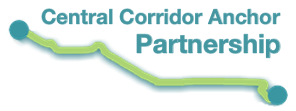Creating Health Care Career Pathways
Nearly 100 high school students participated in Scrubs Camp at Saint Paul College the last week of July. Conducted in partnership with HealthForce Minnesota, Scrubs Camp was supported by Regions, Fairview, and HealthEast, anchor institution members of the Central Corridor Anchor Partnership (CCAP). These partners share a goal of achieving better local health outcomes, improved educational achievement, and increased household incomes by developing a more diverse, local workforce.
Scrubs Camp Activities: From Stem Cells to Aging Bodies
Throughout the week, students participated in blocks of activities that introduced them to different areas of health care. “I’m starting to think about college and careers and I think Scrubs Camp will help me explore careers in health care and see if it’s something I’d like to do,” said one Scrubs Camp participant.
Day two of the week-long camp saw students rotating through activities including the placebo effect, aging suits, a pathogen outbreak, stem cells, and simulation bus and van.
Sabrina Hemmerling, Pharmacy Technician Instructor at Saint Paul College, taught camp participants about the placebo effect. Students made their own placebo capsules in addition to designing their own drugs.
In the aging suits block led by Melissa Miller, students were introduced to geriatrics by experiencing the physical effects of aging. Students dressed up in the aging suits and were given everyday tasks such as picking something up off the ground and going up and down the stairs.
"Aging suits was fun,” said a Scrubs Camp participant. “We put on this outfit and it hurt my back and actually made me feel old.”
Using the scientific method, students identified pathogens over a course of activities as part of a case study presented by the Minnesota Department of Health (MDH). Scrubs Camp students learned about all the activities that go on at MDH, from restaurant inspection to infectious disease monitoring. Students also had the opportunity to swab an item of their choice, such as a cell phone or the bottom of their shoe, to see how much bacteria grew within a day.
Randy Daughters from the University of Minnesota Stem Cell Institute discussed regenerative medicine, the uses of stem cells, and stem cell research using model organisms. Students learned about the ability of some organisms to regenerate limbs, tails, and even hearts. Using tadpoles, students regenerated tails over the course of about two days. In addition, students engaged in an in-vitro fertilization activity to obtain embryonic stem cells from an African clawed frog.
Dual-degree holder Daughters shared his academic path with students. “You’re here to explore different health care careers,” said Daughters. “At one point I was there. I remember it being fun, but not knowing what I was going to do. Dual degrees are designed to train people to investigate different things that come into the clinic and essentially advance the science, so you’re doing the research and doing the clinical work.”
Training Like a Healthcare Professional
The Ridgewater Simulation Bus (SimLab L1), a mobile lab with high-tech simulation equipment, allowed students to participate in a customized training scenario. SimLab L1 features a mock emergency/patient care room, birthing simulator, pediatric training simulator, and Laerdal SimMan 3G, a state-of-the-art patient simulator that displays neurological and physiological symptoms. In the Children’s Simulation Van, students diagnosed a four-year-old patient with pneumonia and trouble breathing. They experienced what it is like to administer a sedative and paralytic and also inserted a breathing tube. Students also delivered a mannequin baby during a birth simulation.
"The Children’s simulator felt real,” commented one of the Scrubs Camp participants. “It made me want to be an EMT."
Health Care Career Exploration
On the final day of camp, students reflected on how the week’s activities influenced their interest in the medical field. “I’m not sure if I want to work in the healthcare field yet, but I am considering it,”said Parker, a Scrubs Camp participant. “My favorite part of the camp was the ‘Jobs Now’ block because we got to learn about all the careers in healthcare,” said another student.
The variety of blocks helped spark students’ interest in specific medical fields. “I’m not sure if I want to work in health care, but if I were to work in the field, I would want to do stem cell research,” commented camp participant Justin.
Camp participant Sulekha knows she wants to be in the medical field. “I want to be an OBGYN, so I liked getting to deliver a mannequin baby,” said Sulekha.
The “Nursing Skills” block allowed camp participant Hto to gain exposure to the field. “We got to take blood pressure and learn about other things nurses do on the job,” Hto exclaimed.
The Next Generation of Health Care Professionals
The sixth annual Scrubs Camp at Saint Paul College closed with student peer award nominations and closing remarks from camp director Sharon Blomgren. “The 36 employers involved in making this camp a possibility are hopeful that you are going to be their employees in the next five to ten years,” noted Blomgren. Students left camp with more than their certificates of completion. They gained valuable professional connections with local health care employers that, for some students, can serve as a gateway into future health care careers.






